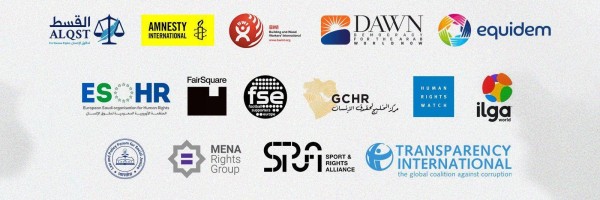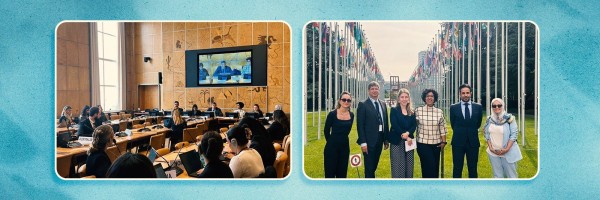ALQST for Human Rights believes that Saudi Arabia is unfit to take up its recent appointment as chair of the Commission on the Status of Women (CSW), the United Nations’ main forum for promoting gender equality and the empowerment of women, in view of the kingdom’s abysmal record on women’s rights and its ongoing persecution of women’s rights advocates.
On 27 March 2024, at its 68th session in New York, the CSW elected Saudi Arabia, unopposed, to chair the forum until March 2025, thus giving it considerable influence over the direction of the world body’s work on women’s issues. Here’s why Saudi Arabia’s appointment raises concerns:
Saudi Arabia’s performance on gender equality is among the poorest in the world
The World Economic Forum’s Global Gender Gap Report for 2023 ranked Saudi Arabia 131st out of 146 countries on its progress toward gender parity, taking into account women’s economic participation and opportunity; educational attainment; health and survival; and political empowerment.
Women in Saudi Arabia lack fundamental rights
Despite some notable reforms in recent years, such as allowing women for the first time to apply for their own passports, and ending the ban on women driving, women in Saudi Arabia still lack many fundamental rights. The male guardianship system that treats adult women as minors has not yet been dismantled. The 2022 Personal Status Law, claimed by the authorities to advance the rights of women, in fact enshrined in law many discriminatory practices against women in matters of marriage, divorce, child custody and inheritance. Women are also still subject to laws requiring their obedience to a male guardian – who may be their father, husband, brother or son – and ‘disobedience’ remains a crime, which means they cannot exercise their new freedoms if their male guardians object. A male guardian’s accusation of disobedience or ‘absconding’ can lead to a woman being detained in a so-called care home (dar al-re’aya), which, far from protecting women and providing shelter from domestic violence, will in fact deprive them of their liberty and often expose them to abuse and neglect.
Women’s rights supporters are systematically punished
While the kingdom’s leaders claim to be champions of women’s empowerment, they relentlessly target for arrest and punishment not only women’s rights activists and human rights defenders but even private individuals peacefully expressing online support for women’s rights. Over the past two years the Saudi courts have convicted and passed long jail sentences on several women for peaceful rights activity on social media, including 18-year-old secondary school student Manal al-Gafiri (18 years imprisonment), Salma al-Shehab (27 years), Fatima al-Shawarbi (30 years), Sukaynah al-Aithan (40 years) and Nourah al-Qahtani (45 years). This has been happening in the context of an intensified crackdown on social media activity in general.
Men have also been targeted for their feminist views, notably Mohammed al-Rabiah, who was arrested on 15 May 2018 during a spate of arrests of women’s rights activists. Despite completing his initial six-year prison term, he faced retrial and was subsequently sentenced to 17 years’ imprisonment. He has also been subjected to brutal torture in detention.
The case of two sisters, Manahel and Fouz al-Otaibi, stands in particularly stark contrast to the authorities’ talk of reform and empowerment for women. They both face charges under the kingdom’s draconian Anti-Cybercrime Law that include “opposing the laws relating to women, such as the male guardianship system and the hijab law”, “participating in several hashtags opposing these laws, notably #isqaat al-wilaaya (‘abolish male guardianship’)”, “having several photos and video clips in indecent clothes on [their] [social media] accounts”, and “going to the shops without wearing an abaya, photographing this, and publishing it on Snapchat”. Their cases thus also highlight the ambiguity of Saudi Arabia’s shifting policy on the issue of women’s clothing.
Meanwhile, prominent women human rights defenders including Nassima al-Sadah, Samar Badawi and Loujain al-Hathloul, who have long advocated for women’s rights, continue to face heavy restrictions since being released from prison, notably travel bans that prevent them from leaving the country.
UN member states have been pressing for women’s rights reforms in Saudi Arabia
In January 2024, in the context of Saudi Arabia’s fourth Universal Periodic Review (UPR) at the UN Human Rights Council (HRC), ten states called for further legal reforms with regard to women’s rights, including abolition of the male guardianship system and the crime of ‘disobedience’; and the repeal of provisions in the 2022 Personal Status Law that discriminate against women and girls, and of the discriminatory provision regarding transfer of nationality in the kingdom’s citizenship law. The appointment of Saudi Arabia to chair the CSW therefore flies in the face of UN efforts in the HRC to push for significant change with regard to Saudi women’s rights.
ALQST’s Head of Monitoring and Advocacy Lina Alhathloul comments: “Given the discrimination entrenched in the kingdom’s laws, and the lack of civic space to push for change, Saudi Arabia is in no position to oversee this UN body’s efforts to further gender equality and women’s empowerment. It should first address its own dire inequalities and violations of women’s rights, and allow peaceful activists to promote and defend them for themselves.
“As a first step, the Saudi authorities must release all those, both men and women, who have been jailed for their feminist stands, such as Salma al-Shehab and Mohammed al-Rabiah, and lift all ongoing restrictions on those who have now been released, such as Loujain al-Hathloul and Maryam al-Oteibi.”




